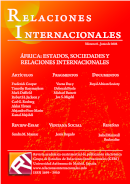Keywords:
colonization , decolonization, Africa, French Empire, French West AfricaCopyright (c) 2008 Frederick COOPER

This work is licensed under a Creative Commons Attribution-NonCommercial-NoDerivatives 4.0 International License.
Abstract
With hindsight, the end of colonial empires and the development of a world of nation-states after World War II seems inevitable. Yet in the long history of empires, even 1945 is too early a date to mark a transition from empire to nationstate. To do so would be to miss the diverse ways in which political actors imagined their futures. In 1945 French leaders did not think of their country as a nation-state. The French nation existed within a more complex state —an empirestate. Some leaders thought empire could become another kind of composite polity, a federation to be renamed the French Union. Its one-time subjects would now be declared citizens. In French West Africa most leaders did not in the late 1940s seek independence, but rather to build a more egalitarian, federal France. Both versions of federalism entailed layered visions of sovereignty —that different peoples would participate in different ways in governing themselves and the federation as a whole.





